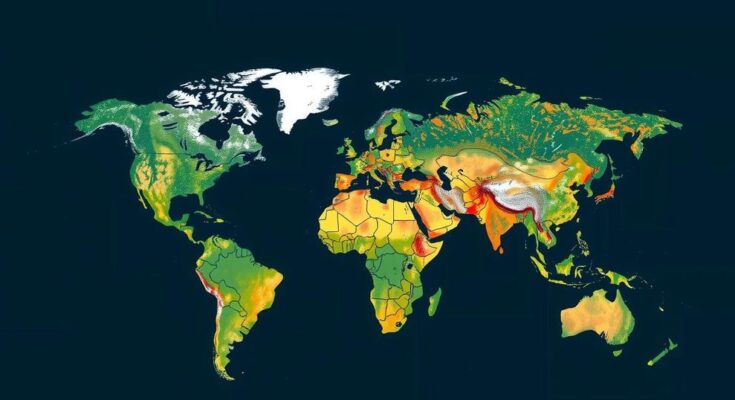This article discusses the critical intersection of climate change and security risks, emphasizing the need for countries to adapt their foreign policies. Featuring insights from experts and upcoming discussions at the Wilson Center, it highlights the potential geopolitical implications of the energy transition and the importance of collaboration in addressing these challenges ahead of COP28.
The global landscape is witnessing unprecedented climate events, including extreme heatwaves and catastrophic floods. Such occurrences are not solely disastrous environmental phenomena; they are eroding community resilience, escalating risks of conflict, and exacerbating socio-economic inequalities. In response, nations are gravitating towards a comprehensive energy transition, which, while essential, introduces its own geopolitical complexities. Recognizing the intertwining dynamics of climate change, conflict, and peace has emerged as a critical objective for governments and international bodies alike. This necessity is encapsulated in the recent COP28 Declaration, which emphasizes Climate, Relief, Recovery, and Peace. To explore the intersection of climate change and security risks, the Wilson Center, alongside the Center for Climate & Security, hosted a dialogue featuring notable experts, including Sherri Goodman, Peter Schwartzstein, Merissa Khurma, and Anne Witkowsky from the U.S. Department of State. The panel discussion, slated for October 1, aims to dissect the global implications of climate change on security threats, trace the evolution of U.S. policies on climate security, and explore avenues for enhancing stability through concerted climate action. Insights will be drawn from two pivotal books: Goodman’s “Threat Multiplier: Climate, Military Leadership, and the Fight for Global Security” and Schwartzstein’s “The Heat and the Fury: On the Frontlines of Climate Violence.” This event promises to provide a platform for exchanging ideas on fostering international cooperation amid the shared challenges posed by climate change.
The issue of climate security has gained prominence as the world confronts escalating environmental challenges. Record-breaking heat, increased flooding, and other climate stressors are not merely natural disasters; they fundamentally threaten the stability of communities worldwide. These stressors are linked to a rise in conflict risks and worsening inequalities within affected populations. In response, there is a collective move towards an energy transition aimed at reducing carbon emissions, but this transition is fraught with its own geopolitical challenges, raising concerns about the implications for global peace and security. The COP28 Declaration highlights the need for integrating climate action into the broader discourse of conflict resolution and international diplomacy, pointing to the urgent need for collaboration among nations to address these intertwined challenges.
In conclusion, the increasing severity of climate-related issues necessitates a strategic response that acknowledges the relationship between climate change and security risks. Events such as the upcoming dialogue at the Wilson Center will shed light on the evolving role of the United States in addressing climate security, reflecting a growing recognition of the urgent need to combat climate change as a pathway to fostering global stability. The insights garnered from the panel will contribute to the discourse on how nations can collaboratively address climate challenges while reinforcing peace and cooperation.
Original Source: www.wilsoncenter.org




